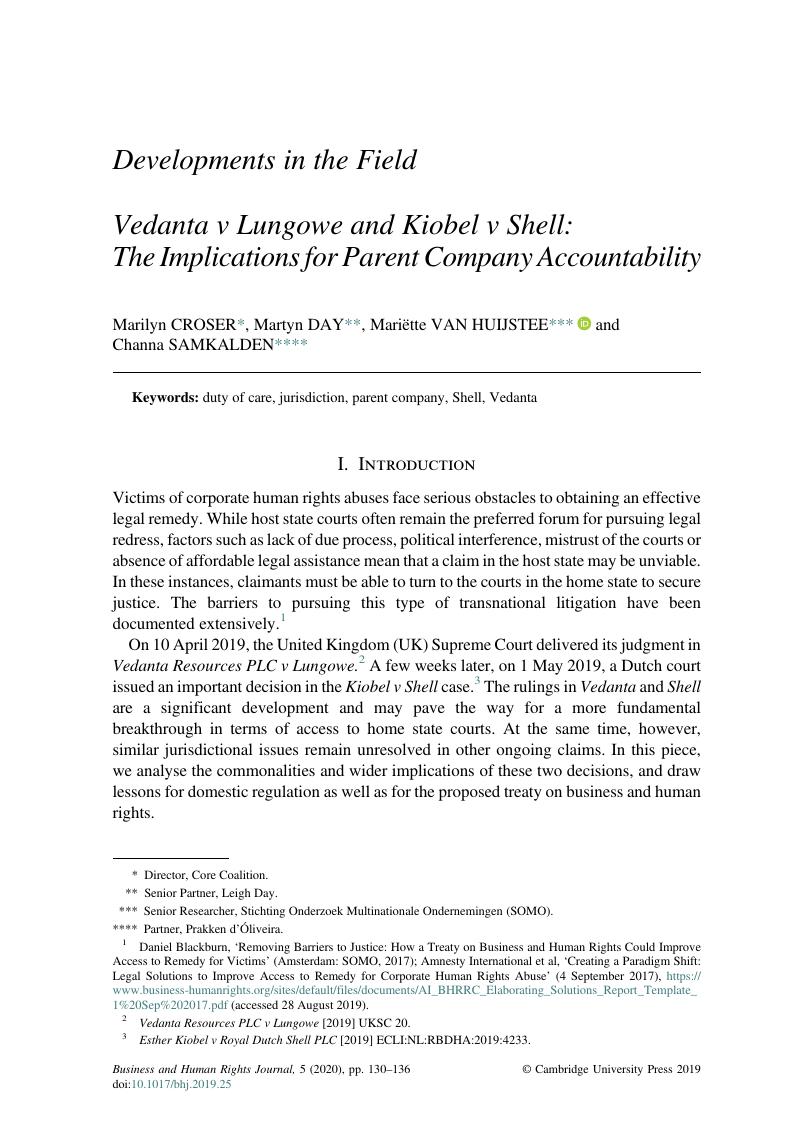Published online by Cambridge University Press: 02 December 2019

1 Blackburn, Daniel, ‘Removing Barriers to Justice: How a Treaty on Business and Human Rights Could Improve Access to Remedy for Victims’ (Amsterdam: SOMO, 2017)Google Scholar; Amnesty International et al, ‘Creating a Paradigm Shift: Legal Solutions to Improve Access to Remedy for Corporate Human Rights Abuse’ (4 September 2017), https://www.business-humanrights.org/sites/default/files/documents/AI_BHRRC_Elaborating_Solutions_Report_Template_1%20Sep%202017.pdf (accessed 28 August 2019).
2 Vedanta Resources PLC v Lungowe [2019] UKSC 20.
3 Esther Kiobel v Royal Dutch Shell PLC [2019] ECLI:NL:RBDHA:2019:4233.
4 Axel Marx et al, Access to Legal Remedies for Victims of Corporate Human Rights Abuses in Third Countries (February 2019), 34, http://www.europarl.europa.eu/RegData/etudes/STUD/2019/603475/EXPO_STU(2019)603475_EN.pdf (accessed 28 August 2019).
5 Ibid.
6 Ibid.
7 Leigh Day, ‘Supreme Court Rules Zambian Villagers’ Case Against Vedanta to be Heard in English Courts’ (10 April 2019), https://www.leighday.co.uk/News/2019/April-2019/Supreme-Court-rules-Zambian-villagers-case-against (accessed 28 August 2019).
8 Ibid.
9 Vedanta Resources PLC, note 2, para 87.
10 Ibid, paras 89 and 100.
11 Ms Kiobel’s earlier case against Shell, filed in the United States in 2002, came to an end when the US Supreme Court ruled that it did not have jurisdiction to hear it.
12 Amnesty International, ‘Nigeria/Netherlands: Shell Ruling “A Vital Step Towards Justice”’ (1 May 2019), https://www.amnesty.org/en/latest/news/2019/05/nigerianetherlandsshell-ruling-a-vital-step-towards-justice/ (accessed 5 September 2019). The judgement is available in English at: http://deeplink.rechtspraak.nl/uitspraak?id=ECLI:NL:RBDHA:2019:6670.
13 Friday Alfred Akpan and Vereniging Milieudefensie v Royal Dutch Shell PLC and another, District Court of the Hague [2013] ECLI:NL:RBDHA:2013:BY9854; Court of Appeal of the Hague [2015], http://deeplink.rechtspraak.nl/uitspraak?id=ECLI:NL:GHDHA:2015:3586 (also in English).
14 Filip Gregor et al, ‘The EU’s Business: Recommended Actions for the EU and its Member States to Ensure Access to Judicial Remedy for Business-Related Human Rights Impacts’ (December 2014), https://corporate-responsibility.org/wp-content/uploads/2015/02/eu_business.pdf (accessed 5 September 2019).
15 [2018] EWCA Civ 191.
16 The Court of Appeal ordered Shell to disclose the requested documents, as it considered that it could not be ruled out that the parent company could be held liable in view of the relevant case law. The court is yet to deliver its judgement on the merits. Friday Alfred Akpan, note 11.
17 Vedanta Resources PLC, note 2, para 44.
18 Ibid, paras 52–53.
19 Ibid, para 61.
20 Gabrielle Holly, ‘Zambian Farmers can Take Vedanta to Court over Water Pollution. What are the Legal Implications?’ (10 April 2019), https://www.business-humanrights.org/en/zambian-farmers-can-take-vedanta-to-court-over-water-pollution-what-are-the-legal-implications (accessed 5 September 2019); Robert McCorquodale, ‘Vedanta v. Lungowe Symposium: Duty of Care of Parent Companies’ (18 April 2019), http://opiniojuris.org/2019/04/18/symposium-duty-of-care-of-parent-companies/ (accessed 5 September 2019).
21 Marx et al, note 4, 112.
22 Ibid.
23 United Nations Human Rights Council, ‘Open-Ended Intergovernmental Working Group on Transnational Corporations and Other Business Enterprises With Respect to Human Rights’, https://www.ohchr.org/en/hrbodies/hrc/wgtranscorp/pages/igwgontnc.aspx (accessed 5 September 2019).
24 United Nations Human Rights Council: Open-Ended Intergovernmental Working Group Chairmanship, ‘Legally Binding Instrument to Regulate, in International Human Rights Law, the Activities of Transnational Corporations and Other Business Enterprises: Revised Draft’ (16 July 2019), https://www.ohchr.org/Documents/HRBodies/HRCouncil/WGTransCorp/OEIGWG_RevisedDraft_LBI.pdf (accessed 28 August 2019).
25 Space does not allow us to discuss the relationship between human rights due diligence and duty of care, but see Cees van Dam et al, ‘Corporate Responsibility to Respect Human Rights vis-à-vis Legal Duty of Care’ in José, JuanRubio, Álvarez and Yiannibas, Katerina (eds), Human Rights in Business Removal of Barriers to Access to Justice in the European Union ( London: Routledge, 2017), 119Google Scholar, 138.